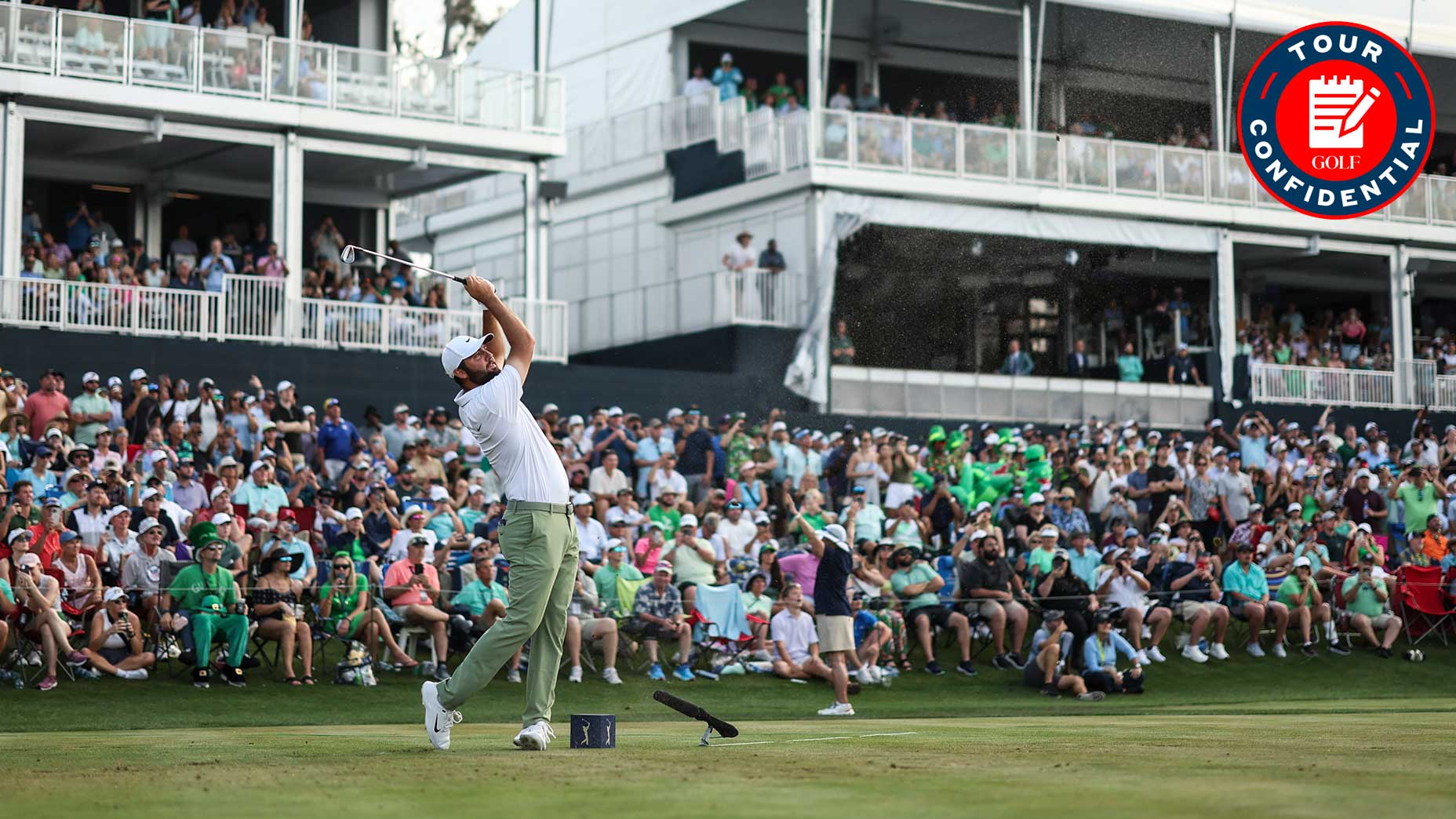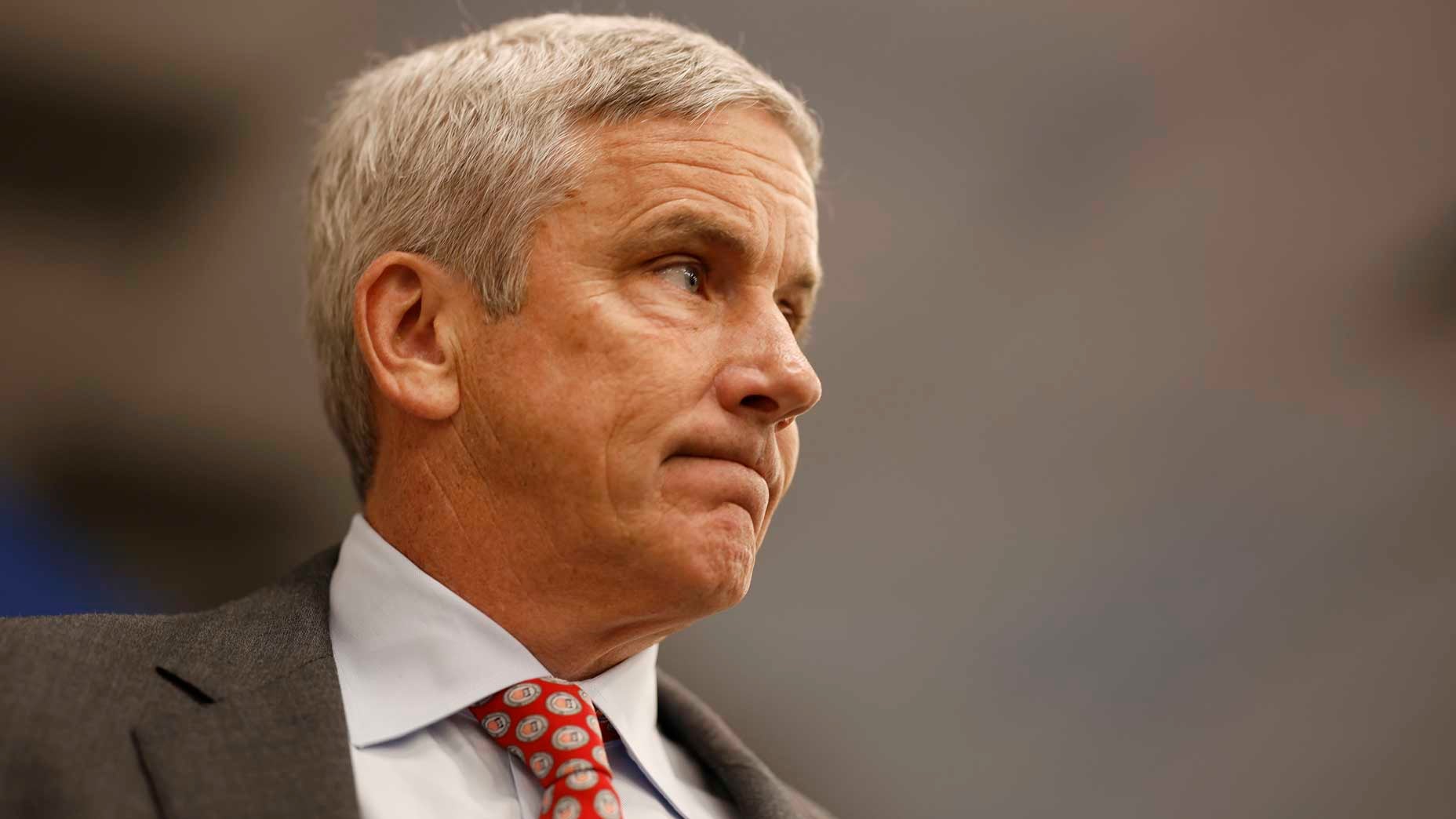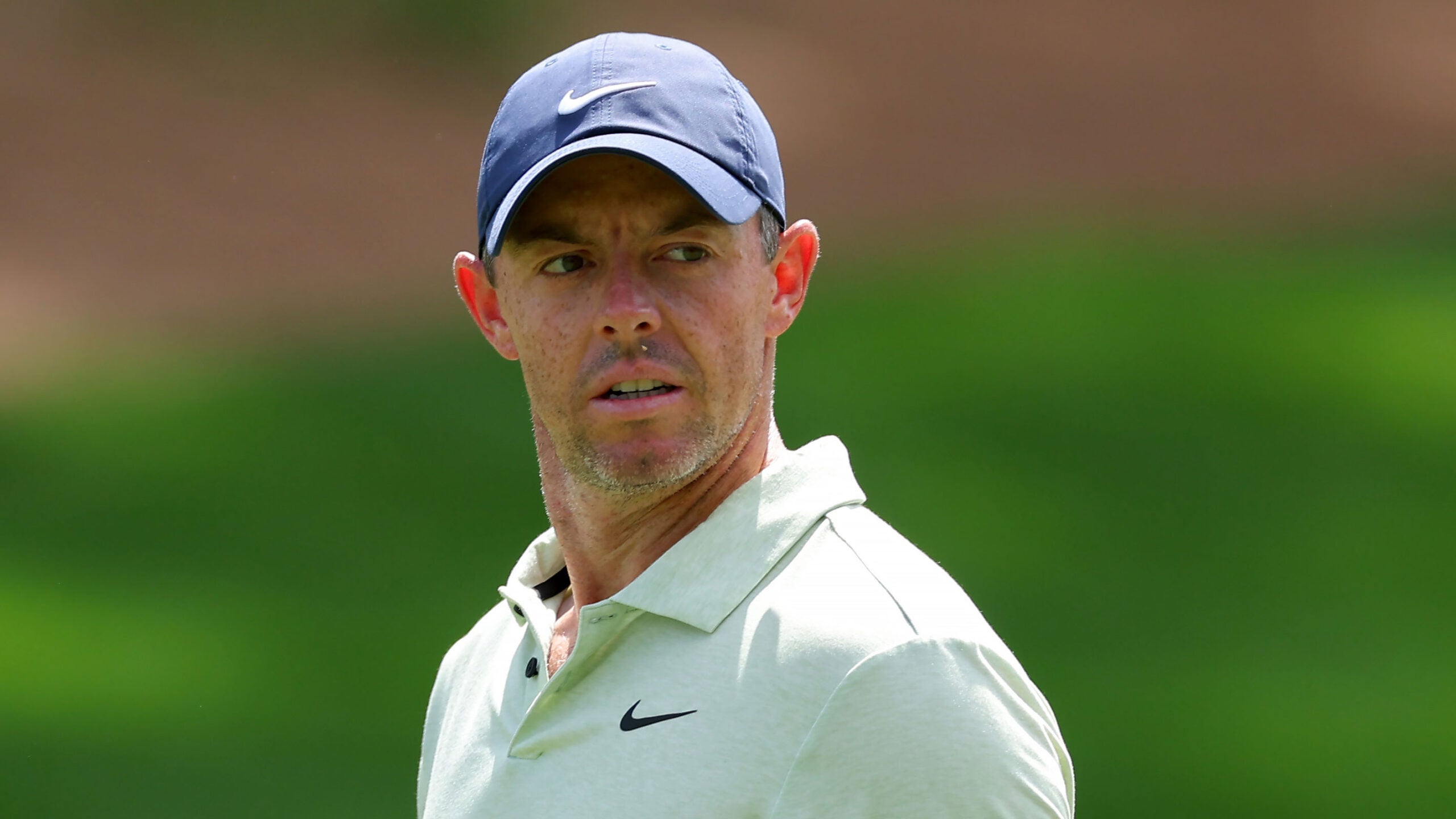
Scottie Scheffler watches his tee shot on the par-3 17th during the final round of the Players Championship on Sunday in Ponte Vedra Beach, Fla.
Getty Images
Check in every week for the unfiltered opinions of our writers and editors as they break down the hottest topics in the sport, and join the conversation by tweeting us at @golf_com. This week we discuss Scottie Scheffler’s Players Championship victory, Jay Monahan’s time with the media, the island-green 17th’s safeguard and more.
Scottie Scheffler became the first back-to-back winner in Players Championship history, closing with an eight-under 64 on Sunday at TPC Sawgrass to beat Xander Schauffele, Wyndham Clark and Brian Harman by one. Battling neck issues all week, Scheffler was seven back through 15 holes on Saturday, cut the deficit to five after 54 holes and opened his final round with a five-under 31 on the front nine. He then waited in the practice area as three stars tried to force a playoff by birdieing the 18th but failed. Was this Scheffler’s most impressive victory yet?
Zephyr Melton, assistant editor (@zephyrmelton): I’d say yes, if only because he was battling injury for much of the week. A stiff neck might not seem like a huge deal, but it did impact his ball speed at times. Being able to perform at a high level — complete with a Sunday 64 — in spite of operating at less than 100 percent is incredibly impressive. Oh, and he gained strokes on the field with his putter. Hard to argue against this being one of the best weeks of Scottie’s career.
Ryan Barath, senior editor (@RDSBarath): As they say, “Beware the injured golfer,” and in the case of Scottie Scheffler, I think his sore neck just added to his play-smart mentality, which through 72 holes made the difference. Considering the group of players in the mix on Sunday, Scottie did what Scottie did best and played to his strengths. One of the standout moments of his round was the birdie he made on the 9th after hitting the green in two. He made an aggressive run at eagle that left him just over 10 feet for birdie, and it was such a confident stroke that it went in dead center.
Josh Sens, senior writer (@JoshSens): What’s most impressive to me isn’t that he did it with a patch on his neck but as the defending champ for the second week in a row: successful title defenses, one after the other, and the first champion ever to repeat at the Players. That’s not just a physical feat. That’s some crazy mental strength and stamina.
Scheffler now has eight wins in his last 26 months, including two in 2024. With the major season just around the corner, could we be in for Scheffler’s best year yet? What’s obtainable for him?
Melton: Scottie is (finally) rolling the rock, and that’s bad news for the rest of the PGA Tour. He proved at TPC Sawgrass that last week was no fluke and again beat one of the best fields in pro golf. If he stays hot with the putter, we could be witnessing the beginning of an all-time great season.
Barath: Scottie with a hot putter is hard to beat. He gained .630 strokes on Sunday and 1.246 for the tournament, which is nothing crazy by any means and still only slightly above average. But this kind of play over the last couple of weeks can only be a confidence boost, and he’s clearly the guy to beat the rest of the year.
Sens: My colleagues have pretty much covered it. It’s gotten to the point where we can pretty much count on Scheffler contending, even when his putter is less than white hot. He’ll rightly be the favorite in every event he enters. I’d be surprised if he doesn’t win at least one major in 2024. So, yeah, I’m banking on this being his biggest season yet.
Some of the Tour’s biggest names (including its last two major champs) battled it out on Sunday afternoon at TPC Sawgrass, giving the Tour some much-needed juice in its marquee event at a time when, due to LIV Golf, its fields have been weakened over the last couple of years. How important was the star power and exciting finish to boot for PGA Tour brass?
Melton: The start to the 2024 season did not go as the Tour brass likely envisioned. Through the first two months, the biggest stars were largely no-shows (save for Wyndham Clark at Pebble). These last two weeks have been a different story. That’s now two Sundays in a row that we’ve had legitimate drama on the back nine with some of the best players in the world duking it out. It’s a refreshing change of pace. Here’s hoping it continues into major season.
Barath: The PGA Tour absolutely needed this week to go well, and I don’t think they could have scripted it any better. Fantastic weather for all four days, a course that played tough but rewarded those playing well, big names showing up in a big way, and it all coming down to the 18th hole with multiple players trying to get into a playoff. If this is the kind of energy the PGA Tour and its broadcast partners can bring to the rest of the Signature Events (and even regular Tour events) the product is going to stand out in a big way.
Sens: This was a fun week, but then again, it usually is. Events like the Players represent the best leverage the Tour has over LIV: events with a history behind them, held on cool venues. But we knew that already, and a great week at Sawgrass doesn’t solve the Tour’s lingering problems, including the fact that much of its schedule has nowhere near that kind of allure.
One of the biggest talkers of the week centered around confusion over the correct place for a Rory McIlroy drop after he hit a tee shot into the water during Thursday’s first round. The players, volunteers, officials, media and TV couldn’t tell without a doubt where his ball entered the water, so the players (Rory, Jordan Spieth and Viktor Hovland) came to a conclusion themselves. But here’s the real question: why doesn’t golf have a better solution for an issue like this? Should we?
Melton: Yes, we absolutely should! At tournaments as big as the Players, let’s have referees (rules officials) on every hole who can make the final call on these sorts of judgment calls. We don’t need to let players police themselves and invite this sort of controversy. Do what every other sport does and have a dedicated ref make the call.
Barath: I love the history of the game and the idea that players call penalties on themselves, but at this point, there is just too much money on the line for things like drops to come down to a judgment call by a player. The PGA Tour needs referees or forecaddies or some sort of technology solution to be able to make calls and take responsibility off the players.
Sens: Pfft. I think this is much ado about relatively little. I don’t mind leaving it to players to do their honest best to arrive at the fairest possible decision. It’s part of the game. A much more common problem in tournaments is when grandstands and other infrastructure give players bailouts that dilute strategy and shot-making demands. If you want to clear up a “drop” problem in the professional game, your energy is better spent on that.
In his first press conference in nearly seven months, PGA Tour commissioner Jay Monahan met with the media at the Players and pledged that he’s the right person to lead the league forward but offered few details on some of golf’s key questions (among them a deal with the Saudi PIF). What was your takeaway from Monahan’s hour with the press? And did he change your view on any key topic?
Melton: I was a little off-put at how prickly Monahan was in his media availability. For a leader who doesn’t have the highest approval rating at the moment, I was surprised he was so combative during his presser. It was another missed opportunity to rehab his image in the view of the public and another knock against his leadership abilities in the eyes of his opponents.
Barath: It’s no secret that these types of speaking engagements aren’t Jay’s strongest skill, and I think he needed to be a bit more receptive to answering some questions, especially ones about players who have gone to LIV, a bit more earnestly. On the flip side, I can understand that he, along with the rest of the PGA Tour, is currently in negotiations that will completely reshape the way they do business, and he can’t just come out and speculate to the media on how things are going. If Jay could find a communication strategy that helps him come off a bit less prickly while also sticking to talking points, I think he would look a lot better in these situations.
Sens: Lots of platitudes and not much in the way of detailed answers, in part, I suspect, because he doesn’t have them. And, in fairness, I’m not sure anybody does. A lot of people who already make a lot of money in the game are convinced they deserve to be making even more. Hard to keep feeding that demand when you’re up against a competitor with bottomless funds.
The par-3 island green 17th at TPC Sawgrass’ Stadium Course always receives plenty of attention, but it also got some criticism from fans and on social media for a narrow but thick ball-stopping “bumper” of rough that bordered the green and, according to some, stopped a few too many balls from trickling into the water. Do you have any issue with the thicker, more forgiving rough?
Melton: I’m indifferent — not all that passionate one way or the other.
Barath: As someone who didn’t like seeing so many balls stop in the rough while backing up with lots of spin, I can’t claim indifference. I think it should have been cut a little shorter to force players to better control spin. When it comes to the 17th hole, I’m all for chaos.
Sens: Multi-faceted website GOLF.com actually addressed this topic before the tournament in an interview with the TPC Sawgrass superintendent. The 17th makes for a tricky balance between fair and unfair. A lot depends on the wind and the weather. If they think it’s going to be dry and blustery, they might not mow around the edges the night before as a safeguard against things getting goofy. What they’re trying to avoid is balls just barely trickling over. I think they struck a reasonable balance this week. If the collar had been mown tighter, we would have likely heard the opposite grousing about how unjust it was that so many balls that landed on the green wound up in the drink.









